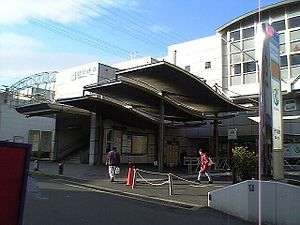Hyōtan-yama Station (Osaka)
Hyōtan-yama Station (瓢簞山駅, Hyōtan'yama-eki) is a railway station on Kintetsu Railway's Nara Line in Higashiōsaka, Osaka Prefecture, Japan.
Hyōtan-yama Station 瓢簞山駅 | |
|---|---|
 | |
| Location | 4-1, Showacho, Higashiōsaka, Osaka (大阪府東大阪市昭和町4-1) Japan |
| Coordinates | 34°39′43.66″N 135°38′23.12″E |
| Operated by | Kintetsu Railway |
| Line(s) | Nara Line |
| Connections |
|
| Other information | |
| Station code | A13 |
| History | |
| Opened | 1914 |
Line
- Nara Line (A13)
Building
The station has two side platforms and four tracks.
| 1 | ■ Nara Line | for Ikoma, Yamato-Saidaiji, Nara and Tenri |
| 4 | ■ Nara Line | for Fuse, Ōsaka Uehommachi, Ōsaka Namba and Amagasaki |
History
- 1914 - The station opens as a station of Osaka Electric Tramway (Daiki)
- 1941 - Daiki merges with Sangu Kyuko Electric Railway; becomes a station of Kansai Kyuko Electric Railway
- 1944 - Becomes a station of Kintetsu
- 1997 - Concourse rebuilt on top of the platforms
- 2006 - Promoted to Suburban Semi Express stop
- 2007 - Starts using PiTaPa
Adjacent stations
| « | Service | » | ||
|---|---|---|---|---|
| Nara Line (A13) | ||||
| Higashi-Hanazono (A12) | Local | Hiraoka (A14) | ||
| Higashi-Hanazono (A12) | Suburban Semi-Express | Hiraoka (A14) | ||
| Semi-Express: Does not stop at this station | ||||
| Express: Does not stop at this station | ||||
| Rapid Express: Does not stop at this station | ||||
| Limited Express: Does not stop at this station | ||||
gollark: YOU.
gollark: SAND
gollark: SANS
gollark: [here](https://pastebin.com/RM13UGFa)
gollark: (here)[https://pastebin.com/RM13UGFa]
This article is issued from Wikipedia. The text is licensed under Creative Commons - Attribution - Sharealike. Additional terms may apply for the media files.